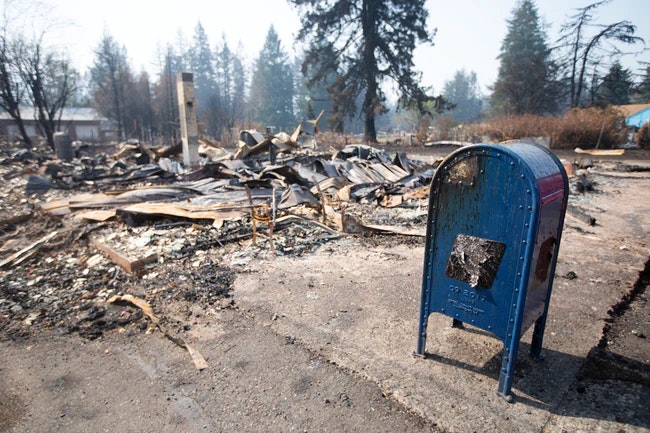
The U.S. Post Office in Gates was destroyed in the wildfires of 2020. (Amanda Loman/Salem Reporter)
Oregon will receive more than $422 million from the federal government for rebuilding from the 2020 wildfires that were among the worst in state history.
The money comes from the U.S. Department of Housing and Urban Development, which is distributing $2 billion in disaster recovery and resiliency funds among nine states and Puerto Rico. Oregon is the second largest recipient of funds after Louisiana, and Oregon and California, which suffered billions of dollars in damage from wildfires in 2020, are the only states in the West allocated money.
“Put simply, climate change is truly a hammer hitting Oregon and many of the states directly in the head,” Gov. Kate Brown said at a virtual press conference to announce the funds on Thursday.
“Our Labor Day fires of 2020 were unlike anything we have seen in recent memory,” she added.
Brown was joined by the federal housing secretary and the governors of Puerto Rico and Louisiana. There is no timeline for when the money will be available. Program requirements, which would include more detail about where and how money can be spent, are in the works and will be published in the Federal Register when ready, according to federal housing officials.
A spokesperson from the Governor’s Office said the priority for funds would be for rural, low and moderate income households, and communities of color. The next step is for the Oregon Housing and Community Services Department to embark on a public engagement process with heavily impacted communities that will inform how the money is deployed, the spokesperson said.
At the conference, Brown said she plans to use the money to aid the most impacted communities and replace homes for people who have been displaced for more than a year. Brown said the state would build fire resilient housing and rebuild businesses. Of the more than 4,000 homes that were destroyed in the 2020 fires, half were manufactured or mobile homes, Brown said, adding that most were in rural parts of the state that already lacked affordable housing options and were going through great economic stress from the pandemic.
“Truly, communities disappeared overnight,” Brown said.
Oregon Capital Chronicle is part of States Newsroom, a network of news bureaus supported by grants and a coalition of donors as a 501c(3) public charity. Oregon Capital Chronicle maintains editorial independence. Contact Editor Les Zaitz for questions: [email protected]. Follow Oregon Capital Chronicle on Facebook and Twitter.
NEWS TIP? Please send an email to [email protected] for our reporters to consider.




